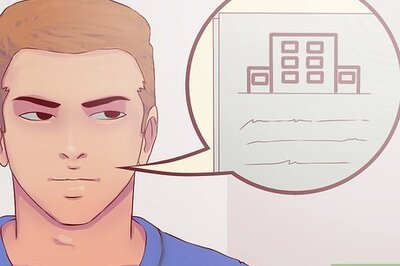
views
What is the difference between dating and hanging out?
A “hang-out” is not necessarily romantic, while a date is. Hanging out with someone is casual and often spontaneous, with little planning or thought behind it. Two people who are just hanging out have not disclosed romantic interest and therefore have no romantic expectations for one another. While they might be friendly with one another, “hanging out” typically involves no flirting or touching, and if there is an activity that costs money, both people cover their own halves. According to dating coach Kimberly Hill, dating is defined as a “mutual agreement that we're exploring and getting to know one another.” Two people on a date have likely expressed romantic interest, and the conversation is focused on getting to know one another better. There may also be talk of a second date in the near future if the first one is going well. “Hang-outs” are reserved for friends, acquaintances, and even colleagues, and are defined by being casual, low-effort, and low-stakes. Dates are clearly romantic in intention and pre-planned, with potential flirting and physical affection shared between the two interested parties. Meet the wikiHow Experts Laura Bilotta is a Dating Coach and Matchmaker with over 21 years of experience, focusing on helping singles date more intentionally and encouraging them to let go of negative patterns so that they can attract the love that they deserve. JT Tran is a Dating Coach and a Dating Advice Columnist for LA Weekly and Baller Magazine with over ten years of dating coaching experience. Kimberly Hill is a certified dating and relationship coach. She helps divorced and single men get unstuck, elevate their dating experiences, and build meaningful connections.
Signs It Is a Date
They’ve invited you on a pre-planned outing. Dating coach JT Tran notes that this is one of the first ways to tell whether an outing is a friendly or romantic. He says, “If [it] was planned well in advance of when it's scheduled, it's probably a date.” However, he warns that “if it was a last-minute decision to catch up because both of you have nothing better to do, it's probably just hanging out.” As a general rule of thumb, planning and thoughtfulness equals date, spur-of-the-moment activity = hanging out.
It’s just the two of you. A date is between two people, usually in an intimate, dimly lit setting. This ambiance allows the couple to chat, flirt, and get to know each other without the pressure of having to entertain other people at the same time. If it’s just you two, sitting close, speaking softly, and enjoying genuine conversation— congrats, you’re on a date! And it seems to be going well. If your meeting is taking place in a large group setting, then it’s most likely not a date. It can still be fun, though! Hanging out with your crush in a group doesn’t necessarily mean that they don’t want to date you. It simply means that that specific group hangout is probably not a date.
They compliment and flirt with you. Dating coach Laura Bilotta encourages you to ask yourself the following questions: “During the date, pay attention: [do they] treat you like a lady or like one of [their friends]? [Are they] offering your compliments? [Are they] instigating physical contact? [Are they] flirting with you and playing along when you flirt? [Do they] offer to pay for the date, or do you go Dutch?” The answers to these questions should clarify their intentions, but trust your gut, too. If the conversation seems mindless, unengaging, and low-effort, this other person might not be too concerned with making a great impression with you, which means they’re better off in the friend zone, anyway. If they’re treating you like a friend, calling you “dude” or “bud,” and keeping their physical distance, then it’s possibly just a platonic hangout.
They pick up the bill. Tran confirms the belief that paying for the meal, event, or activity cements the fact that it is indeed a date. He says, “Studies have supported this: when you offer to pay, the assumption is that it is a date, as opposed to if you were to split it, then that would be platonic or friends.” If they don’t offer to pay, they probably have friendly intentions, although this isn’t the case 100% of the time. If you’re comfortable doing so, ask them for clarification. Try saying something like, “Honestly, I thought this was a date up until you asked to split the bill. Was I reading this wrong?”
There are plans for a second date. Typically, after a good first date, one or both interested parties suggest making plans for a second romantic outing. Whether they’re plans to go check out the touring art exhibit in town or the hot new Italian bistro up the road, someone who is romantically pursuing you will be keen to lock in another date. If there’s no talk of going out again, if they don't follow up after the date, or if you discuss plans but never solidify details (like, "We should do this again sometime"), then they may just be in it for the friendship with you.
Why is dating so hard to navigate?
Dating can be hard to navigate due to changing attitudes about monogamy and marriage. Deciphering the differences between dating and hanging out has become more and more difficult in this modern dating climate. “Hanging out” feels low-pressure, so you can essentially test-drive the relationship and see what it would really be like. Hanging out has become a norm for many people because there's less pressure to be defined by labels, and there are fewer strict social expectations than there were, say, 30 years ago. Additionally, there is less cultural emphasis on marriage, causing many young people to shift priorities over to friendships and careers (including friendships with people of other genders). Gender norms are also more relaxed than in the past, rendering a “hang-out” a gender neutral request and harder to determine romantic interest, as opposed to earlier times in which an invite from a heterosexual male to a female inherently implied romantic interest. While it's great that social expectations and gender norms have become more relaxed, it has also made it harder to tell when someone's romantically interested!
FAQ
Can I ask if it’s a date? Definitely! When in doubt, there is no shame in asking whether something is a date or a casual hangout between friends. Actually, it shows that you have good communication skills and respect the relationship enough to ask for clarity to avoid misunderstandings. If you’re unsure as to whether this other person has asked you out as a friend or in an attempt to woo you, try saying something like: “Hey, I just wanted to make sure— is this a date or a friendly hang?” “No pressure at all, but I did want to ask so that I know what to expect— is this a date?” “Out of curiosity, is this a date?”
What’s a “situationship”? “Situationship” is a relatively new relationship term that’s taken social media by storm. In essence, it describes a flexible arrangement in which two people enjoy certain perks of being in a romantic relationship, like going on dates and being intimate, without the label or commitment of officially being in a relationship. Situationships are slightly different from having a friends with benefits because there are clear terms to a friends-with-benefits, which generally involves having a physical relationship and little else. On the other hand, situationships are purposely undefined, often blurring the lines of intimacy and causing one (or both–- to wonder if they’re moving in the direction of a serious relationship… or not.
How do I move on from rejection if it’s not a date? Feeling disappointed after being rejected is a perfectly human response. If you got your hopes up about going on a date with your crush, only to find out that they invited you out in a friendly, non-romantic way, it can feel emotionally crippling. The best course of action is to feel all your feelings, process them by chatting with a close friend or writing in your journal, and then dusting yourself off and picking yourself right back up. Rejection is simply redirection, and this other person certainly wasn’t the last fish in the sea. So, just keep swimming!




















Comments
0 comment